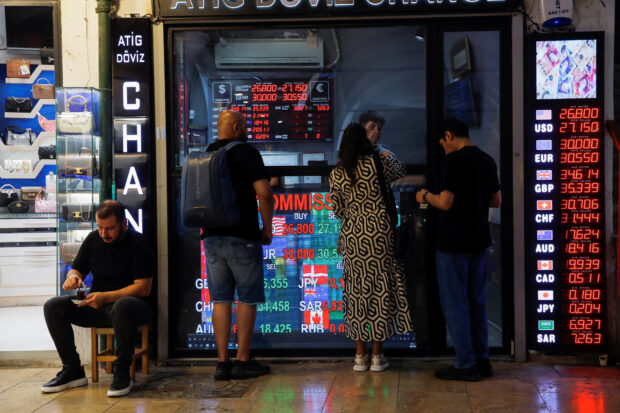Dollar up ahead of Fed decision, euro slips ahead of GDP data

People visit a currency exchange office in Istanbul, Turkey July 18, 2023. REUTERS/Dilara Senkaya/File Photo
TOKYO/LONDON -The U.S. dollar edged higher on Tuesday, as traders awaited the Federal Reserve’s monetary policy decision this week for clues on when the U.S. central bank might cut rates, while the euro was down ahead of euro zone flash GDP data for the fourth quarter due at 1000 GMT.
Data on job openings from the U.S. Department of Labor Statistics due later on Tuesday will in the meantime offer a prelude to the closely watched payroll report to be released on Friday.
The dollar index was 0.1 percent higher at 103.55 as market participants moved cautiously ahead of the two-day Fed meeting that begins on Tuesday.
With the Fed expected to hold interest rates steady, markets will focus on the tone that Fed Chair Jerome Powell strikes at the press conference on Wednesday and any hints of rate cuts in the near future.
READ: Fed rate cuts may wait as inflation ticked up in December
Article continues after this advertisement“After Fed Chairman Jerome Powell’s dovish comments at the press conference following the last meeting, market participants are likely to be looking for more precise information on the timing of the first rate cut,” said Michael Pfister, FX Analyst at Commerzbank.
Article continues after this advertisementMarkets are currently pricing in a 46.6 percent chance that the U.S. central bank will begin cutting in March, dropping from 73.4 percent a month ago, according to the CME Group’s FedWatch Tool, as data has been reinforcing the view that the U.S. economy remains resilient.
Tuesday’s U.S. job opening figures will kick off a week of domestic jobs data, culminating in the January U.S. payrolls report on Friday. The data will give further indications of the state of the world’s largest economy.
Euro zone GDP in focus
The euro was down 0.12 percent at $1.0819 ahead of flash GDP data for the fourth quarter in the euro zone, where expectations are for a much weaker outlook than in the U.S.
READ: Euro zone to tighten fiscal policy in 2024, some still to spend too much
The single currency is down 2 percent in January as investors moved to fully pricing in a rate cut by the European Central Bank (ECB) in April.
“Risks remain tilted to the downside for the single currency as long as these rate-cut expectations prevail among investors,” UniCredit analysts told clients in a note.
Sterling slid 0.15 percent to $1.2690 ahead of the Bank of England’s monetary policy meeting this week.
Elsewhere, the U.S. currency flattened at 147.46 against the yen.
With Japanese policy normalization looking more likely in the second quarter, when the Bank of Japan (BOJ) will have additional wage data, the dollar-yen rate will “be more driven by the Fed than any expectations of a policy shift by the BOJ in the short term,” said Wei Liang Chang, currency and credit strategist at DBS.
“We thus expect dollar/yen to ease more pronouncedly towards the end of Q1.”
Japan’s jobless rate fell to 2.4 percent in December from the previous month, government data showed on Tuesday, just under economists’ median forecast of 2.5 percent in a Reuters poll.